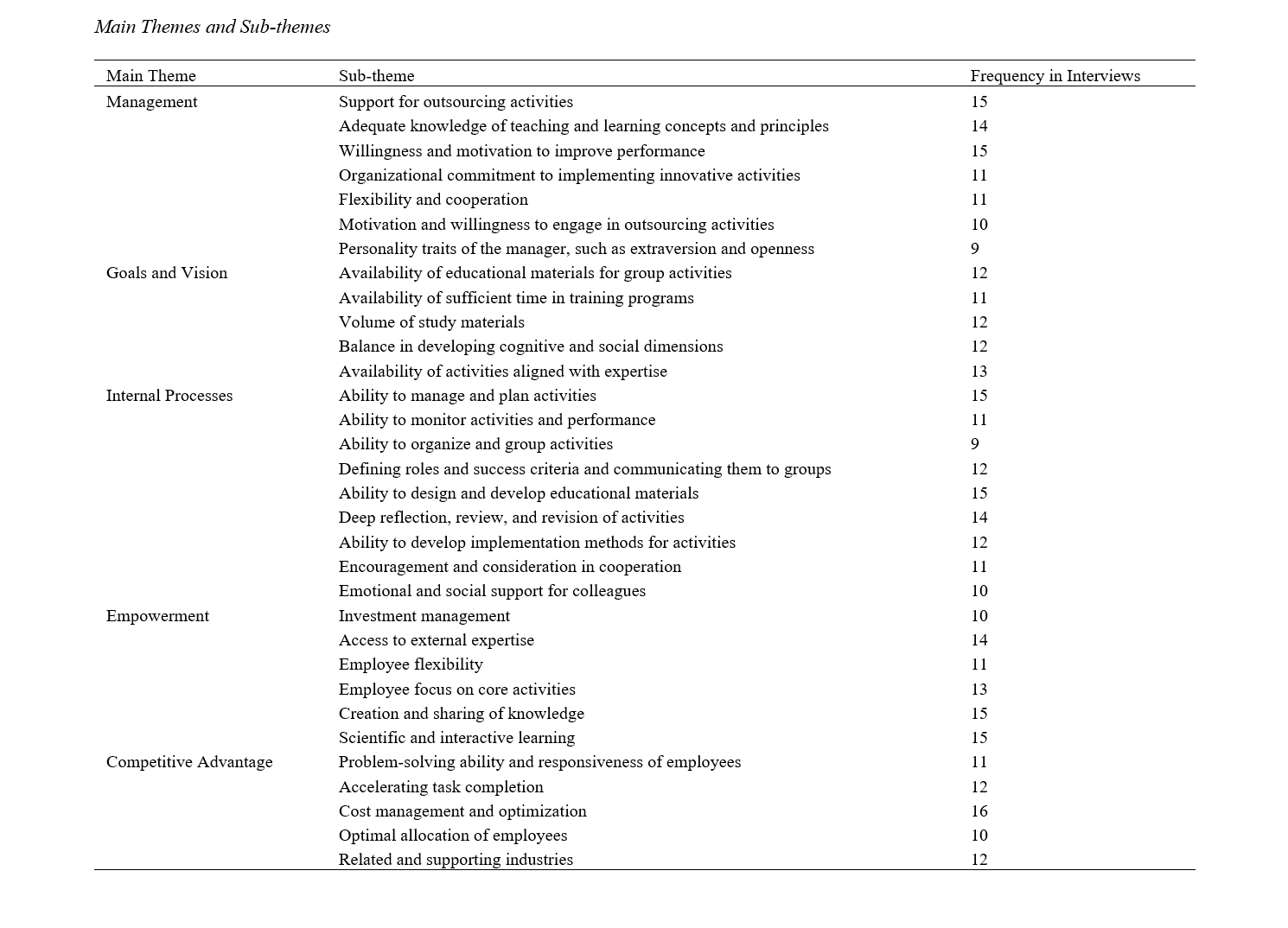Decision-Making Process for Outsourcing Training in the National Iranian Gas Company
Keywords:
Outsourcing , crisis decision-making, human resource management, Outsourcing training servicesAbstract
Modern organizational and managerial transformations have made the outsourcing of organizational training services essential. Accordingly, the aim of this study was to determine the decision-making process for outsourcing training in the National Iranian Gas Company, using a mixed-method approach with a sequential-exploratory design of the categorization type. The research strategy in the qualitative section was content analysis, while in the quantitative section, it was a survey. Through content analysis, the literature was reviewed to identify the initial criteria for outsourcing training services, and semi-structured interviews were conducted with 15 experts selected through purposive sampling. Qualitative data analysis was performed using open and axial coding with MAXQDA software. To ensure the credibility and trustworthiness of the qualitative data, Guba and Lincoln’s criteria—including credibility, dependability, confirmability, and transferability—were applied. In the next stage, the extracted criteria were screened and confirmed using the fuzzy Delphi method with the input of 20 experts. In the quantitative section (DEMATEL), 37 experts selected through purposive sampling responded to pairwise comparison questionnaires. Quantitative data were analyzed using DEMATEL and the Analytic Network Process (ANP) with MATLAB and Excel software. The criteria were categorized into five main dimensions: goals and vision, management, empowerment, internal processes, and competitive advantage. In the fuzzy Delphi stage, out of 32 components (with 3 components eliminated), 29 components were screened and confirmed. DEMATEL results indicated that the "goals and vision" factor had the highest interaction (influence/influence received), followed by internal processes, management, competitive advantage, and empowerment, respectively, in terms of interaction with other factors.
References
Alami, R., & Fattahi, M. (2018). The Importance of Human Resources in Management Development (A literature Review). IJRDO - Journal of Applied Management Science, 4(3), 01-17. https://doi.org/10.53555/ams.v4i3.1912
Alamtabriz, A., & Shayesteh, R. (2011). Evaluation and Prioritization of Tax Collection Process Outsourcing in the Iranian National Tax Administration by Employing the Fuzzy TOPSIS Approach [Research]. Journal of Tax Research, 19(10), 189-220. http://taxjournal.ir/article-1-103-en.html
Ashourpour, S., & Najafi, A. (2015). Relationship between Human Resource Development Strategies and Staff Productivity in Psychiatric Hospitals Affiliated to Iran University of Medical Sciences. Hakim-Journal, 18(2), 153-161. http://hakim.tums.ac.ir/article-1-1515-en.html
Behi Far, M., Razavi, M. R., & Jafari, P. (2023). Identifying geomechanics technological capabilities in the oil and gas industry. Journal of Petroleum Geomechanics, 6(2), 48-63. https://doi.org/10.22107/jpg.2023.407649.1201
Behi Far, M., Razavi, M. R., & Jafari, P. (2024). Geomechanics technological capability in the upstream oil and gas industry Tehran. http://www.irpga-journal.ir/article_178268.html
Ebrahimi, E. (2019). Presenting a Framework to Identify Competencies of Sport Managers based on a Multi-Criteria Decision-Making Model. Human Resource Management in Sport Journal, 7(1), 1-17. https://doi.org/10.22044/shm.2020.8414.1988
Ebrahimpour Azbari, M., Abdollahi, A., Akbari, M., & Gholami, K. (2021). Ranking of Supplier Selection Indicators for Outsourcing Services under Uncertainty. Roshd -e- Fanavari, 65(17), 46-55. https://doi.org/10.52547/jstpi.20769.17.65.46
Eze, I., & Omena, E. S. (2019). The Importance of Human Resource in Nigerian Organisational Development. The Melting Pot, 5(2). https://journals.aphriapub.com/index.php/TMP/article/view/1042
Gholizadeh, M., Zolfaghari Zafarani, R., & Mohammadian Saravi, M. (2022). Presenting a human resource development model focusing on productivity in the country's tax administration using the structural equation approach. Journal of Innovation and Value Creation, 19(10), 185-204. http://rimag.ricest.ac.ir/fa/Article/33264
Guchhait, R., & Sarkar, B. (2024). A decision-making problem for product outsourcing with flexible production under a global supply chain management. International Journal of Production Economics, 272, 109230. https://doi.org/10.1016/j.ijpe.2024.109230
Honarvar, M., & Rezaee, H. (2019). Optimal Outsourcing Strategy Determination and Pricing Model in Dual-Channel Supply Chain under Uncertainty. Research in Production and Operations Management, 10(1), 155-174. https://doi.org/10.22108/jpom.2018.109674.1115
Kshetri, N. (2017). Blockchain's Roles in Strengthening Cybersecurity and Protecting Privacy. Telecommunications Policy, 41, 1027-1038. https://doi.org/10.1016/j.telpol.2017.09.003
Mohammadi, Z., & Tahmasebi, S. (2020). Investigating the relationship between partial service outsourcing and human resource productivity https://civilica.com/doc/1036320/
Mosca, J. B., & Bordelon, G. R. (2017). Human Resource Managers Detect Management & Legal Disadvantages to Outsourcing. Business, management and economics research, 3(2), 8-17. https://ideas.repec.org/a/arp/bmerar/2017p8-17.html
Romero, M., Sandefur, J., & Sandholtz, W. A. (2020). Outsourcing Education: Experimental Evidence from Liberia. American Economic Review, 110(2), 364-400. https://doi.org/10.1257/aer.20181478
Tabatabaei, S. M. J., & Mohammadi, P. (2021). Evaluating the outsourcing of operational supervision of civil partnership facilities in Bank Maskan and examining possible methods using the AHP method. Scientific Quarterly of Islamic Economics and Banking(34), 87-120. https://mieaoi.ir/browse.php?a_id=924&sid=1&slc_lang=fa
Taghizadeh, H., & Divanbeigi, A. (2021). Investigating factors influencing the decision to outsource at the Mashhad Water and Wastewater Company. Operations Management Quarterly, 1(1), 39-60. https://journals.iau.ir/article_682591.html
Vining, A. R., & Globerman, S. (2017). The outsourcing decision: a strategic framework. In Global Outsourcing Strategies (pp. 27-40). Routledge. https://doi.org/10.4324/9781315254197-11
Viseh, S. M., Adinehvand, M., & Shiri, A. (2023). Investigating the Impact of Team Coaching on Group Decision-Making and Social Responsibility with the Mediating Role of Human Resource Flexibility (Case Study: Government Organizations in Ilam City). Ilam Culture, 24(80-81), 7-26. https://www.farhangeilam.ir/article_191354.html

Downloads
Published
Submitted
Revised
Accepted
Issue
Section
License
Copyright (c) 2025 Zahra Ashookh (Author); Seyyed Ahmad Hosseini Gol Afshani; Seyed Ali Akbar Ahmadi (Author)

This work is licensed under a Creative Commons Attribution-NonCommercial 4.0 International License.









